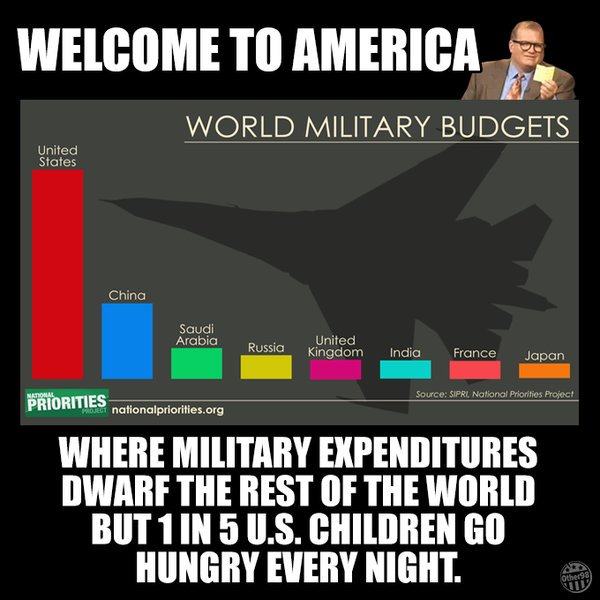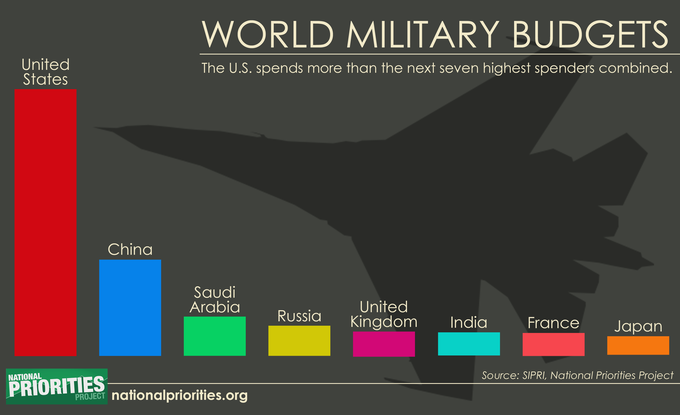
An Open Letter on the Pentagon Budget
The Project On Government Oversight and the Coalition on Military Spending
To: The Honorable James Inhofe, Chairman, Senate Committee on Armed Services
The Honorable Jack Reed, Ranking Member, Senate Committee on Armed Services
The Honorable Adam Smith, Chairman, House Armed Services Committee
The Honorable Mac Thornberry, Ranking Member, House Armed Services Committee
(August 16, 2019) — The undersigned groups represent a broad, bipartisan coalition concerned about wasteful and ineffective spending at the Pentagon. As you prepare to conference S. 1790 and H.R. 2500, the National Defense Authorization Act for Fiscal Year 2020, we hope you will keep in mind ways to eliminate wasteful and unnecessary spending, implement smart reforms that enhance national security, and increase transparency and oversight over Pentagon spending.
We are very concerned that authorizing $733 billion or more in spending, including $69 billion for a wartime slush fund, is in excess of our national security needs. We are also disappointed to see a continued pattern of using that slush fund for programs and projects unrelated to our wars or contingencies, including using those funds for military construction.[1]
A number of recent studies have identified opportunities to reduce the Pentagon’s budget by hundreds of billions of dollars.[2]
These recommendations come on the heels of public opinion surveys that indicate the American public is reticent to continuously increase Pentagon spending, including a recent Gallup survey that found that nearly three-quarters of Americans would not support more of their tax dollars going to the Pentagon.[3]
While others are recklessly calling for massive increases in funding at the Pentagon, we urge you first to look at sensible reforms that could save billions of dollars per year from the bloated Pentagon budget while maintaining national security.
We urge you to include the below provisions in the final bill:
- Repeal the requirement for the Department of Energy to demonstrate the capability to produce plutonium pits at a rate sufficient to produce 80 pits per year by 2027; instead set a goal of no more than 30 pits per year. Reduce $241.2 million from the National Nuclear Security Administration (NNSA) request of $712.4 million to expand pit production beyond 30 pits.
- Direct the DoD to pursue compensation from the contractor for costs of non-Ready-For-Issue (RFI) spare parts that it failed to deliver since 2015 as described in the June 13, 2019 Department of Defense (DoD) Inspector General Report No. DODIG-2019-094.
- Fund Afghanistan Security Forces at no more than $4.5 billion.
- Fund the Ground Based Strategic Deterrent (GBSD) at no more than $489.4 million.
- Require the National Nuclear Security Administrator to conduct an analysis of alternatives with respect to replacing the ICBM W78 warhead, limit funding until the analysis of alternatives is submitted, and require an independent study of the W78 replacement; Reduce by $59 million the NNSA request for the W87-1.
- Fund the Ukraine Security Assistance Initiative at no more than $250 million.
- End a decades-old provision that requires the military to purchase coal in Pennsylvania and ship it overseas to heat a single military base in Germany.
- Fund the Sea Launched Cruise Missile at no more than the Pentagon request of $5 million; Eliminate the NNSA request of $5.6 million; require a report on operational and budget impacts of the missile; Do not establish as a formal DoD program of record.
- Require studies on potential cost savings to service contracts, the nuclear security enterprise and force structure by a combination of the Comptroller General, federally-funded research and development centers, a nongovernmental think tank and the Congressional Budget Office.
- Require a report on financial costs and national security benefits for overseas military operations, including permanent military installations and bases.
- Preserve the requirement for the Pentagon Director of Operational Test and Evaluation to produce a public annual report.
- Require an annual audit to help identify waste in DoD and require DoD to submit a plan for achieving an unmodified audit opinion within five years; Require an annual report ranking each of the military departments and Defense Agencies in order of how advanced they are in achieving unmodified audit opinions.
- Require a Government Accountability Office (GAO) report on defense business processes including analyzing the DoD’s development of a culture that recognizes the importance of business processes and reengineering initiatives necessary to achieve improved financial management.
- Require the DoD to report to Congress on ways they are finding and implementing savings laid out by the 2016 Defense Business Board report and for alternative recommendations to achieve identified cost-savings.
- Require a report on reducing the costs of operating the military commissaries and exchanges by $2 billion over five years.
- Coordinate annual research requests across all military services and offices.
Given the breadth and scope of the Department’s budget—the largest single pot of discretionary taxpayer dollars— solemn consideration is needed to ensure that our nation’s war-fighting capabilities have the most effective impact while meeting the highest standards. There is a presiding public interest in including the above recommended reforms, as evidenced by the wide ideological spectrum of the under-signed groups, and it is critical that Congress take the opportunity to take action.
We thank you for considering our broad consensus for encouraging robust debate on the many opportunities to find sensible savings to make our nation more secure.
Sincerely,
About Face: Veterans Against the War
CODE Pink
Center for International Policy
FreedomWorks
Friends Committee on National Legislation
National Priorities Project at the Institute for Policy Studies
National Taxpayers Union
Nuclear Watch New Mexico
Overseas Base Realignment and Closure Coalition
Peace Action
Portsmouth-Piketon Residents for Environmental Safety and Security
Project On Government Oversight
Savannah River Site Watch
Taxpayers for Common Sense
Taxpayers Protection Alliance
Tri-Valley CAREs
Win Without War
Women’s Action for New Directions
World BEYOND War
[1] Taxpayers for Common Sense, “Military Construction Projects in Europe: The Camel’s Nose Under the Runway,” August 3, 2018. https://www.taxpayer.net/national-security/military-construction-projects-in-europe-the-camels-nose-under-the-runway/
[2] Center for International Policy, Sustainable Defense: More Security, Less Spending, June 19, 2019. https://static.wixstatic.com/ugd/3ba8a1_a4b3e64658d44dbf9271ce8ca5310dcb.pdf;
[3] Poor People’s Campaign, Institute for Policy Studies, the Kairos Center, and Repairers of the Breach, the Poor People’s Moral Budget: Everybody Has the Right to Live, June 2019. https://ips-dc.org/report-moral-budget/;
[4] Project On Government Oversight, Spending Smarter, Spending Less: Opportunities to Reduce Excessive Pentagon Spending, May 15, 2019. https://www.pogo.org/resource/2019/05/spending-smarter-spending-less-opportunities-to-reduce-excessive-pentagon-spending/; and Cost Assessment and Program Evaluation, Office of the Secretary of Defense, Comparing the Cost of Civilians and Contractors: Performance of Comparable DoD Functions, April 2017. https://admin.govexec.com/media/gbc/docs/pdfs_edit/dodcontractorcivilianpart1.pdf and https://admin.govexec.com/media/gbc/docs/pdfs_edit/dodcontractorcivilian-part2.pdf .
[5] Gallup News, “Demand Wanes for Higher Defense Spending, March 12, 2019. https://news.gallup.com/poll/247622/demand-wanes-higher-defense-spending.aspx? ;
[6] AP-NORC, “Americans Are Dissatisfied with the Government’s Spending Priorities,” 2018; http://apnorc.org/projects/Pages/Americans-are-dissatisfied-with-the-government’s-spending-priorities.aspx;
[7] Eurasia Group Foundation, “Worlds Apart: U.S. Foreign Policy and Public Opinion,” February 2019. http://egfound.org/stories/independent-america/worlds-apart#exec-sum ;
[8] University of Maryland Program for Public Consultation/Voice of the People, “Majorities of Republican and Democratic Voters Agree on $128 Billion in Deficit Reduction, Raising Revenue and Cutting Spending,” July 31, 2018. http://www.publicconsultation.org/federal-budget/majorities-of-republican-and-democratic-voters-agree-on-128-billion-in-deficit-reduction-raising-revenue-and-cutting-spending/;
[9] Ronald Reagan Presidential Foundation & Institute via Military Times, “Survey finds strong support for military members, less support for military funding,” December 1, 2018. https://www.militarytimes.com/news/pentagon-congress/2018/12/01/survey-finds-strong-support-for-military-members-less-support-for-military-funding/

POGO Endorses Bill to Increase Oversight of Wartime Spending
Danielle Brian / Project on Government Oversight
To: The Honorable Stephen Lynch
2109 Rayburn House Office Building
Washington, DC 20515
Dear Representative Lynch:
(July 15, 2019) — I am writing in enthusiastic support of your bipartisan bill to reestablish the Commission on Wartime Contracting, H.R. 3576.
The Project On Government Oversight (POGO) is a nonpartisan independent watchdog that investigates and exposes waste, corruption, abuse of power, and when the government fails to serve the public or silences those who report wrongdoing. We champion reforms to achieve a more effective, ethical, and accountable federal government that safeguards constitutional principles.
Your bill is just such a reform. As Pentagon spending has increased—including spending through the overseas contingency operations budget, which the Pentagon uses as a slush fund for other departmental priorities—there is an increased need for oversight and accountability. Further, both Democratic and Republican presidents have asserted expanded powers to use force; this merits closer scrutiny as well. By reestablishing an independent, bipartisan legislative commission dedicated to holding hearings on waste, fraud, abuse, and mismanagement of wartime contracts, this bill will greatly benefit American taxpayers and our troops.
This Commission would be able to closely scrutinize a number of issues of concern, including the abuse of the classification system to hide information essential for accountability,1 whether current operations overseas are authorized and in compliance with international law,2 and whether our military aid to foreign governments is accomplishing its stated goals.3 A dedicated commission can dig into depth on these issues, and give them the attention they deserve.
Thank you for your leadership on this issue. I urge your colleagues to support this bill.
Sincerely,
Danielle Brian, POGO Executive Director